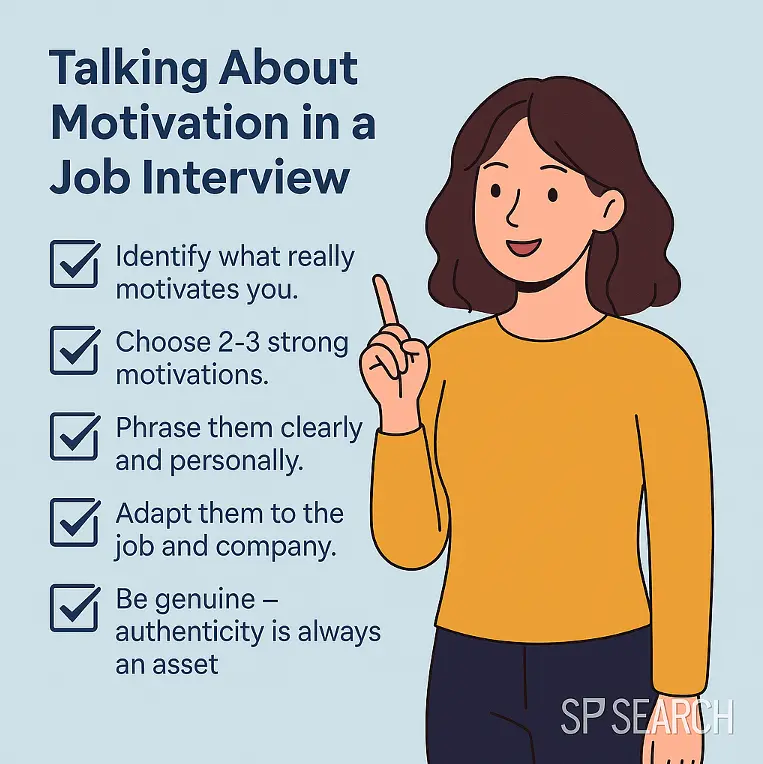Beyond skills, recruiters want to understand what truly drives you. They want to know if your sources of motivation align with the role, the work environment, and the company’s values.
A clear, authentic, and well-articulated motivation can make all the difference. Here’s how to identify it and express it powerfully.
1. Understanding Professional Motivation
Motivation is what pushes us to act, commit, and persevere. In a professional context, it can be:
- Intrinsic: motivation driven by enjoyment or personal fulfillment (learning, overcoming challenges, creating…)
- Extrinsic: motivation driven by external factors (salary, status, job security, recognition…)
We can group the main sources of motivation into three major categories:
Personal Development
Everything related to growth, learning, and recognition of effort:
- Challenging oneself
- Intellectual curiosity
- Career advancement opportunities
- Healthy competition
- Regular feedback
Work Conditions
Tangible aspects related to the organization and environment:
- Autonomy
- Compensation
- Job security
- Mobility
- Well-being / work-life balance
Relationships and Impact
Connection with others and personal contribution:
- Work atmosphere
- Sharing knowledge
- Social impact
- Influence / decision-making power
- Recognition of ideas
2. Why Do Recruiters Care?
By asking about motivation, recruiters are looking to understand:
- Whether you’ll be engaged and fulfilled in the role
- Whether you can envision yourself in the long term
- Whether your expectations align with what the company offers
- Whether your presence will positively contribute to the team
A strong answer is personal, concrete, and connected to the role.
3. How to Identify Your Motivations
Even without taking a formal test, you can do a quick self-reflection.
Ask yourself:
- What do I truly enjoy in a job?
- What energizes me daily?
- What do I struggle with in a work environment?
Then, identify your top 3 motivations:
Here’s a helpful list:
- Learning new things
- Taking on responsibility
- Working in a team
- Being autonomous
- Being recognized for my work
- Having a healthy work-life balance
- Earning a good salary
- Sharing my skills
- Making a positive impact
- Working in a pleasant atmosphere
- Taking on challenges
- Having a stable position
4. How to Talk About It in an Interview
Use a simple structure to build your answer:
“I’m motivated by [motivation] because it allows me to [value or need].”
“That’s what I found in [past experience], and it really energized me.”
Examples:
- “I’m motivated by autonomy because I enjoy organizing my work in my own way. In my previous job, I was in charge of planning an entire project, which allowed me to be more efficient.”
- “Social impact is important to me: knowing that my work helps others gives me a sense of purpose. I experienced this fully during a volunteer mission where I supported people reintegrating into the workforce.”
5. Aligning Your Motivations with the Role
One of the most important steps is to align your motivations with what the job offers.
Examples:
- For a sales role: competition, performance, variable pay
- For a non-profit job: social impact, teamwork, meaningful environment
- For a start-up: autonomy, initiative, fast learning
Make the connection during the interview:
“What motivates me is the opportunity to learn quickly and step out of my comfort zone. That’s exactly what I appreciate about agile companies like yours.”
In Summary: 5 Key Takeaways
- Reflect on what genuinely motivates you, not what you think the recruiter wants to hear.
- Choose 2 to 3 strong motivations you can illustrate with examples.
- Express them clearly and personally.
- Tailor them to the job description and company culture.
- Be sincere: authenticity is always a strength.

Keep in Mind
Talking about your motivations isn’t about “selling yourself” — it’s about showing what drives you and why you’ll be engaged.
The better you understand your personal drivers, the more confident and convincing you’ll be.





